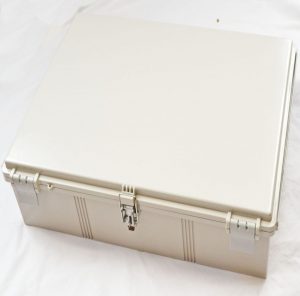Even while we are continuing to work as an essential business producing electronic enclosures, especially NEMA rated enclosures, it is hard to focus on anything other than the Covid-19 crisis. We are based in Ohio and no matter your politics, our governor has been in the forefront of the effort nationally to develop safe procedures and processes. While we are incredibly grateful that none of our employees have yet to test positive for the virus and no relatives of any have succumbed to the disease, we all know people who have been ill. Our first priority has been to keep our employees as safe as possible while still doing all we can to service our essential customers and it has been an incredible challenge and yet also a learning experience.
There have been two overriding issues that have taken up much of our energy over the last few months. First, while there has been a lot of discussion about the disruptions to the electronics supply chain; we have not experienced any significant issues with the early exception of product coming in from China. We have seen some increase to international shipping times, but that often varies and we rarely ship via air due to our product size which we know has been impacted. However, each day is a scramble for PPE. As the guidelines have changed, we find we are often receiving materials that are no longer in demand. Early on, we required all employees to wear gloves. The dash was on to find enough especially in multiple sizes and that are durable enough to withstand factory work while not impeding their efforts. We were lucky enough to get them in, but then the requirements changed and gloves were no longer recommended, and so, of course, backorders shipped and we find ourselves with excess gloves. Thermometers, especially no touch versions, also have consumed our time. We debated on buying a unit that would take people’s temperatures as they walked through the door, but then we realized that people would have to line up outside the door in all kinds of weather and be socially distanced while they entered, so we stuck with the “reach” thermometers. We finally got our second set last week. Then we went through the mask ordeal. We had n-95 masks for our powder area, but decided that we should donate some of our extras to the local hospital back in March not realizing that all would be required to wear masks. We luckily found a t-shirt company that was switching to mask production and got some of their first products. And hand sanitizer has become more difficult to find than gold in a river bed.
The other issue has been working with our team to insure that they stay as safe as possible within our facility. Social distancing is not easy in a factory where people are used to gathering to solve problems, review drawings, or discuss schedules. We have done some instruction on best practices (print multiple copies of the drawing or have one person review at the terminal and the other use the printed copy, for example). Back away when the inspector comes by to check the product or someone else needs to use your terminal. Spray down the keyboards regularly with alcohol during the day is another new standard. However, when you have many 25, 30 and even 40 year employees, changing habits is not easy for them and yet, they are often the most at risk.
As with any business challenge, we have learned a great deal that will apply to our business in the future. How to be even more nimble than normal in decision making, how to plan for disruptions in our logistics and develop rapid alternatives, and most of all, how to communicate constantly with our team to avoid misunderstandings (and we have had a few) and to work to build mutual trust whenever there are unique situations. We know we are all gaining new skills and hope that as the economy revives, we can come out of this stronger and more resilient.


